- Home
- Upton Sinclair
World's End (The Lanny Budd Novels) Page 5
World's End (The Lanny Budd Novels) Read online
Page 5
Thus in the view of Lanny Budd the meaning of “being poor” was that his lovely mother was outclassed in the race for attention. She would never be listed as one of the “ten best-dressed women of Paris.” Fortunately she was of a happy disposition and did not let these hardships mar her life; she learned to make a joke of them, and also a virtue. She would talk about her unwillingness to “pay the price,” a remark which some of her friends might have resented as a reflection upon themselves.
But these were matters beyond Lanny’s understanding as yet. He would try to console his mother. “I’m glad you’re poor. If you weren’t, I wouldn’t see even a little of you!”
She would hug him, and tears would come into the lovely blue eyes. “You’re the best thing in the whole world, and I’m a foolish woman ever to think about anything else!”
“That’s the way I’d like it!” Lanny would grin.
II
The reason why Robbie stayed so long on this trip was that he had another deal on, and Beauty was helping him. That was an aspect of their relationship which Lanny had learned about, and in which he also took part according to his abilities. Customers had to be met “socially,” something far more effective than mere business acquaintanceship. In the latter case they would be thinking only about money, but in the former they would like you; at any rate they would pretend they did, and you would try to make it real. You had to “entertain” them, and for this purpose what could be more helpful than a woman with the charms of Beauty Budd? For this well-recognized part of the selling of munitions Robbie paid generously.
The Russian Minister of War would be planning to visit Paris with his wife. Robbie had scouts who kept him posted, and he would telegraph Beauty, who would at once inquire among her friends and find someone who knew either the minister or his wife, and would invite them down for a few days to warm their old bones. Beauty would meet them and make an engagement for tea, and wire Robbie, who would come in a shiny new car and take the tired old couple motoring, and show them the Corniche road, and maybe let them have a fling in the Casino at Monte Carlo.
Robbie’s agents would have provided him with a regular dossier about such guests, including their tastes and their weaknesses. Beauty would have several duchesses and countesses at the tea party, and when the minister took his seat at the gaming table, Robbie would slip him a bundle of thousand-franc notes and tell him laughingly to take a “flier” for him. The old gentleman would do so, and if he lost Robbie would tell him to forget it, and if he won he would forget it without being told. Later, when Robbie would tell him news about the marvelous new sub-machine gun which Budd’s were putting on the market, the minister would be deeply interested and would make a date for Robbie to demonstrate it in St. Petersburg.
When Robbie was leaving to keep that date, he would say to Beauty: “I can’t motor to St. Petersburg. I’d get stuck like Napoleon in the snow.” Yes, there was snow in Russia, impossible as it might seem in Juan-les-Pins, where everybody lay around on the beach absorbing sunshine. “That old car of yours is beginning to look shabby,” he would add. “You better take mine. But don’t let anybody swindle you on the old one; you ought to get five or six thousand francs for it at least.” If Beauty protested that he was too generous, Robbie had a formula: “It goes on the expense account.”
A marvelous phenomenon, the expense account of a munitions salesman, which could be stretched to include both his business and his pleasures. It included the newspaper man who brought the tip, and the detective who prepared the dossier. It included the car, and the chauffeur, and the gambling losses. It included the tea party and, strange to say, it might even include some of the duchesses and countesses—those who were so important that it was an honor for a Russian cabinet minister to meet them, instead of for them to meet a Russian cabinet minister.
Such subtle distinctions you had to know thoroughly if you wanted to land contracts. The great ladies knew their own value and the value of the service expected. If it was to get the wife and daughter of an American millionaire presented at the Court of St. James’s, that might be worth a thousand pounds; but if it was just a matter of introducing you to a politician or a financier, that might be done for a thousand francs.
Of course there were members of the nobility who were not for sale. Some English milords were so rich they could afford to be dignified. Some of the old French families were poor as church mice, but chose to live in retirement, dress dowdily, and pray for the return of the Bourbon pretender. But the people Robbie Budd made use of belonged to the grand monde; their pleasure was to shine in public, and the ladies especially were frequently in debt and ravenous for money. Beauty made it her business to know them, and with her woman’s tact she would find out what service they could render and what they would expect. Some were frank, and would name their price and be prepared to haggle over it; others took a high tone, and said they would do it to oblige dear, darling Beauty. These were the persons who got more.
Thus Lanny, opening his eyes to the world in which he was to live, came to realize that among the swarms of elegant and showy people who passed through his home there were all sorts and sizes, and each had to be treated differently. A few were friends whom his mother loved and trusted; others were there for business reasons, and might turn out to be “horrid people,” who would go off and say mean things about her behind her back. When that happened she would cry, and Lanny would want to kick those false friends the next time he met them. But that was another lesson of the grand monde which you had to learn; you never kicked anybody, but on the contrary were as effusive as ever, and the most you allowed yourself was a sly little thrust with a sharp stiletto of wit.
III
The new deal was to be with Rumania, which was about to supply part of its army with automatic pistols; this had become necessary because Bulgaria had just done the same. Several countries in southeastern Europe had fought two wars among themselves in the past three years, and no one could guess when the next one would start, or who would be fighting whom. Budd’s was putting out for the European trade a new eight-cartridge 7.65 mm. automatic which it claimed was the best in the world. Of course Robbie always had to claim that, but in this case he told Lanny that he really believed it.
He had in Paris a fellow by the name of “Bub” Smith, who had been a cowboy and could shoot the head off a hatpin, and would have done it while the hat was on a lady’s head if there had been any female willing to face a William Tell from Texas. Robbie had arranged for this man to come whenever needed, because army officers were generally so impressed by good marksmanship that they would attribute it to the gun. Now he was going to bring Bub to the Riviera to meet a certain Captain Bragescu, a member of the commission which was making preliminary investigations prior to the final tests in Bucharest. Robbie laughed about that phrase “preliminary investigations,” which meant that the captain wanted to look into Robbie’s pocketbook before he looked into his pistol.
The captain arrived unannounced, just after Robbie and Beauty had gone off to a dinner dance. A taxi drew up in front of “Bienvenu,” the bell at the gate tinkled, and Rosine ushered into Lanny’s presence a mincing and elegant figure with mustaches dyed black and twisted to sharp points, in a sky-blue military uniform fitting tightly and drawn in at the waist so that you knew he was wearing corsets. You might have found it hard to believe that an army officer would have his cheeks painted and powdered and would smell strongly of perfume, but so it was.
Lanny was embarrassed, because he had on some old fishing togs and a fisherboy named Ruggiero was waiting for him down on the beach. But he welcomed the guest courteously, and explained where his father and mother had gone, and offered to telephone them at once. “Oh, no!” said Captain Bragescu. “I would not think of interfering with their engagement.”
An idea occurred to Lanny. “I wonder if you’d be interested in seeing torch-fishing.”
“What do you get?” asked the officer. It turned out that he had done a
lot of fishing at home.
So Lanny ran down to the boathouse, where there were some of Robbie’s old clothes and a warm sweater—for it turns cold on the Riviera the moment the sun disappears behind the Estérels. The captain took off his corsets, and proved to be not in the least, effeminate. Down the beach they met an Italian fisherboy, a year or two older than Lanny, and strong as his work required. The Rumanian spoke good French, but had trouble with a mixture of Provençal and Ligurian, so Lanny had to help out.
While Ruggiero rowed the heavy boat out toward the Cap, the army officer told about the fishing he had seen in his boyhood, at the mouth of the Danube, for the huge sturgeon. It was a rather ghastly procedure, for they cut out the roe, containing seven million eggs, and then threw the fish back alive. This was the black caviar, the epicure’s delight—but Lanny wouldn’t enjoy it quite so much for a while.
The sea was smooth except for long swells, and when the torch was blazing you could see much farther into the depths than you could reach with the trident. Peering down among the rocks, you would see a langouste poking out his greenish-gray head. You would get the three-pronged spear poised above him and strike, and up he would come, snapping his heavy tail back and forth. He was pleasanter to have in the boat than an American lobster, because he had no big claws that might take off one of your fingers.
Also, there were fishes of many hues and sizes; they seemed to be dazzled by the light, and even an amateur like the captain could hit one now and then. Presently he saw a head underneath some waving branches of a sea plant; he struck, and was all but jerked into the water. “Look out!” shouted the fisherboy, and leaped to help him. It was fortunate the officer didn’t have those corsets on, for now he needed every particle of muscle and wind he had.
They brought up a huge green moray, the largest of all the eels, and the most dangerous. Ruggiero gaffed him, but cried: “Don’t haul him into the boat!” He clubbed and stabbed the creature until the life was all gone out of him, for he had teeth as sharp as razor blades. He was more than six feet long, and when you saw him down in the water you thought he was clad in elegant green velvet.
He had been esteemed as a food fish ever since the days of the ancient Romans; so the pair had a fine story to tell Beauty and Robbie in the morning. Lanny’s reputation as an entertainer of customers was much enhanced; for Captain Bragescu might have thought that dinner dances were got up for business reasons, but he couldn’t doubt that this eager lad really admired his prowess as a fisherman.
IV
Bub Smith showed up on the morning train; a stocky fellow with a funny flat face—his nose had been broken in a fall from a horse and there had been nobody to set it, so he just let it stay as it was. But there was nothing the matter with either his eyes or his hands. “I’m feeling fine this morning,” he said; “I could shoot holes through the side of a barn.” He looked at Lanny with a twinkle in his pale blue eyes; they were old pals, and Bub had taught Lanny cowboy songs. He was introduced to the army captain, and was just about speechless at the spectacle of a man with paint and powder on his face and corsets under his sky-blue uniform.
Well, they motored back into the hills, where there was a little valley with a heavy forest of eucalyptus, and a peasant who for a few francs would let them shoot holes in his trees. The chauffeur lugged a couple of heavy boxes out of the car, one with the 7.65 mm. automatics and the other with the cartridges; Bub took a cardboard target and tacked it onto a big tree about thirty paces away. Meantime Robbie was loading the pistols. “I want to show you how quickly it can be done,” he said. Pretty soon Bub took his stand, and quick as a flash threw up his arm and fired. The shots came so fast it was just a whir, and there was the target with the central bull’s eye shot clean out.
Captain Bragescu, of course, was enraptured by such a performance. Pierre, the chauffeur, ran and got the target for them. You could see parts of the circle made by each bullet, but there wasn’t any hole that wasn’t part of one big hole. “I’ll take that back to Bucharest with me!” said the captain.
“Wait,” replied Bub; “I’ll make you a few more.” So they tacked up another target, and Bub took a different gun and did it again; he was ready to do it as long as the ammunition held out.
But the officer was convinced. “C’est bon,” he said. He wouldn’t be too enthusiastic, for it was a matter of business, but he repeated several times: “Out, c’est bon.”
He tried it himself, and spattered the target all over with his shots. Bub showed him how to swing up the gun, and how to keep it from jerking, and then he did better. Robbie took his turn. He knew all about shooting, of course, and apologized to the captain for being too good; it was just a matter of understanding this remarkable weapon, he said.
Then Lanny took his turn. The army weapon was too heavy for him, but he had brought along his own thirty-two. Lanny was pretty good, but nobody seemed really good after Bub Smith. When the captain learned that Bub had been a cowboy, he exclaimed:
“Ça s’explique! I have seen them in the cinema. We need men who can ride and shoot like that in Rumania. We are troubled with mountaineers who don’t like to pay taxes.”
V
They went home to lunch, and Beauty had some friends in; but you could see that Beauty herself was company enough for Bragescu. He could hardly take his eyes off this delicate creation in pink and cream and gold. She, being used to that sort of thing, was kind, but sedate and never the least bit flirtatious. Lanny always got plenty of motherly attention at such times. He was too young to understand these subtleties, but he played up to her all the same, and they made a sweet and sentimental pair.
It was the Baroness de la Tourette who was supposed to do the entertaining of the officer. Sophie Timmons had been her maiden name, and her father owned a chain of hardware factories in several towns of the Middle West. He sent his only daughter lots of money, but never enough for her husband the baron, who lived in Paris and had very expensive tastes. The baroness had one of those henna heads, and had what you might call a henna laugh; she talked fast and loud, half in French and half in English, and was considered to be the life of every party. Lanny was too young to observe that while she chattered her eyes would roam restlessly, as if her mind were not entirely on her work. She was his mother’s best friend, and had a kind heart in spite of all her smartness.
The captain was taken off by Robbie to have the drawings of the Budd automatic pistol explained to him. Afterward they all went for a sail, and watched the sun sink into the Mediterranean; then they dressed and went to Cannes to dine at a fashionable resort, and later came home to play poker. Lanny was just getting into bed when he heard them come in and settle themselves at the table, and he peeked in at the door for a bit.
They made a pretty sight in front of the big open fire of crackling pine; the men in evening dress, except the Rumanian in a blue and gold dress uniform; the ladies in lovely soft dresses cut halfway down their smooth white backs. They had picked up friends at the restaurant, including Lord and Lady Eversham-Watson. She was another rich American who had married a title, but she had used better judgment; his lordship was a large, solid, and rather dull gentleman past middle age, but he admired his gay wife and liked to see her shine in company. She was a talkative little woman who managed him and made it acceptable by joking; her money came out of a Kentucky whisky known as “Petries’ Peerless.”
Lanny had never been taught to play poker, but had watched it sometimes. They might still be playing when he woke up in the morning, and would go on playing most of the day; he was used to the sight of Petries’ Peerless and soda bottles on the side table, and half-empty glasses, and the not very pleasant odor of stale tobacco smoke, and little ashtrays filled with stubs. He was used to hearing how “rotten” his father was as a poker player, and would smile to himself, for this was one of the secrets which he shared with Robbie, who used as much skill in losing as other people did in trying to win.
Always to the right man, of course
! This time Captain Bragescu would be the lucky one. Robbie, bland and smiling, would draw cards every time, and wait until the captain gave signs of having a strong hand, then raise him, and finally quit and drop his cards without showing them. After this had happened a few times the captain would realize that it was safe for him to bet heavily, and when Robbie would propose to raise the limit, he would agree. This would go on for hours, until the lucky officer had most of the chips piled in front of him, and would think that he owned the world. At the end Robbie would say: “It’s amazing how you’ve mastered our American game.” It was such a decent way to arrange a contract for guns that the captain could not fail to appreciate it. The guns were all right, of course, and the Rumanian army would be safe from the Bulgarians and able to capture the rebel mountaineers and collect the taxes.
VI
Robbie motored to Marseille to meet some member of his family who was coming from Egypt, and Beauty went to dance at a ball which a friend was giving in one of the white marble palaces on the heights above Nice. It would last until morning, and she would sleep there and return later. Lanny settled himself to the reading of a well-worn novel which somebody had picked up on a bookstall and left in the house.
It was a story about slum life on the outskirts of an American industrial town. The district was known as the “Cabbage Patch,” and in it lived an Irish washerwoman with a brood of children, all dreadfully poor, but so honest and good that it touched your heart. Lanny, whose heart was always being touched by one thing or another, found this the dearest and sweetest of stories. By next morning he was nearly through with it and, sitting in the warm sunshine of the court, with narcissus beds around him and a huge bougainvillaea throwing a purple mantle over the kitchen porch, he yearned to have been born in a slum, so that he might be so generous and kindhearted and hard-working and helpful to everybody around him.

 Prince Hagen
Prince Hagen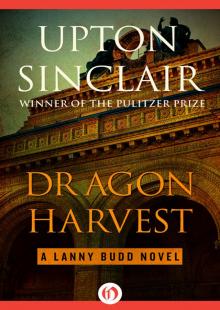 Dragon Harvest
Dragon Harvest The Jungle
The Jungle Sylvia's Marriage
Sylvia's Marriage Oil! A Novel by Upton Sinclair
Oil! A Novel by Upton Sinclair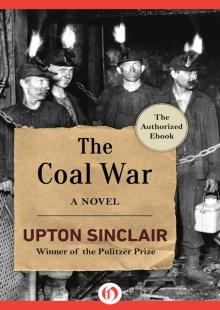 The Coal War: A Novel
The Coal War: A Novel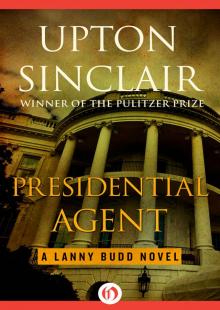 Presidential Agent
Presidential Agent World's End
World's End The Second-Story Man
The Second-Story Man O Shepherd, Speak!
O Shepherd, Speak!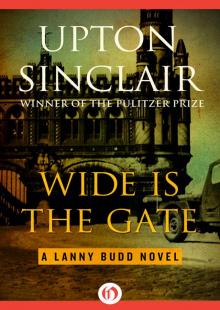 Wide Is the Gate
Wide Is the Gate The Return of Lanny Budd
The Return of Lanny Budd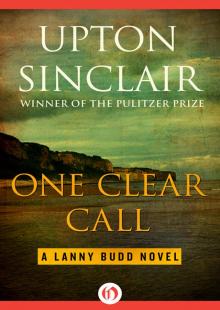 One Clear Call I
One Clear Call I 100%: the Story of a Patriot
100%: the Story of a Patriot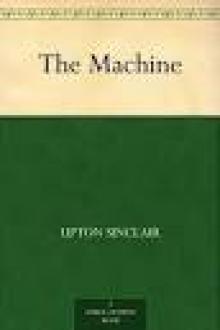 The Machine
The Machine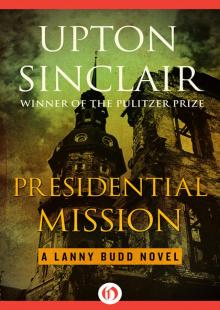 Presidential Mission
Presidential Mission A Cadet's Honor: Mark Mallory's Heroism
A Cadet's Honor: Mark Mallory's Heroism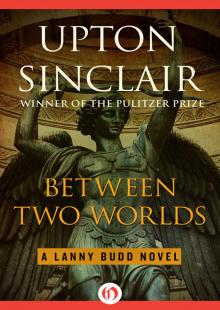 Between Two Worlds
Between Two Worlds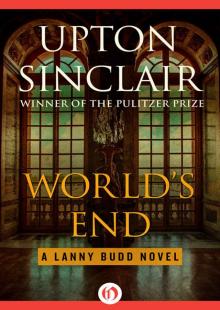 World's End (The Lanny Budd Novels)
World's End (The Lanny Budd Novels)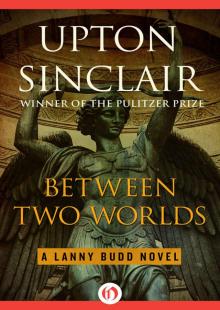 Between Two Worlds (The Lanny Budd Novels)
Between Two Worlds (The Lanny Budd Novels)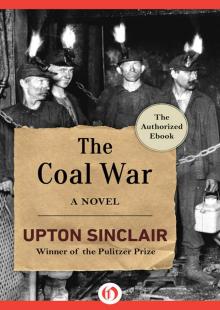 The Coal War
The Coal War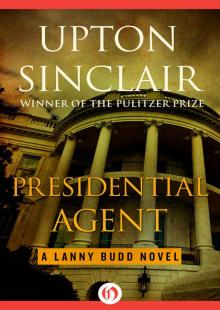 Presidential Agent (The Lanny Budd Novels)
Presidential Agent (The Lanny Budd Novels) Oil (filmed as There Will Be Blood)
Oil (filmed as There Will Be Blood)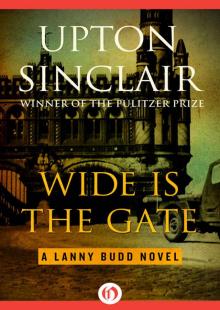 Wide Is the Gate (The Lanny Budd Novels)
Wide Is the Gate (The Lanny Budd Novels)